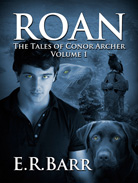
 |
What if there was more to your life than being born, growing up, having a career and a family, and then dying? What if there was a greater purpose for your existence, a plan that if acted upon could change the course of the world? This theme infused many of the tales from ancient literature and continues to course through the plotlines of bestselling novels in the modern era. Readers seem to love stories about people of destiny, and Barr's book gives them what they want.
Like many literary characters Conor Archer isn't at first aware that he is anyone special. He's just a kid in Chicago, trying to come to grips with a having a mother who is dying and finding some solace by playing his tin whistle in an Irish pub. But when a strange biker lures him into the shadows and then savagely bites him between the thumb and index finger of his hand, Conor's life begins to rapidly change. His mother dies that same night, and Conor soon finds himself leaving the urban world he has grown up in and adapting to life in Tinker's Grove, a small village alongside the Wisconsin River where his Aunt Emily lives. But this is not some bucolic paradise but rather a nexus between what we see as reality and the deeper reality known as the Otherworld, a future battlefield where the fate of earth might very well depend on whether or not Conor chooses to accept his destiny.
Like a river, Barr's debut novel ripples at times with suspenseful moments before rushing headlong into intense action scenes. However, the narrative frequently drifts over into calmer waters, backwater chapters that lovers of faster-paced novels might feel they have to wade through. While this may put off some, it will not necessarily be a game-breaker for many readers. After all, even J.R.R. Tolkein, one of the authors Barr himself is fond of, was known for such quieter interludes in works like The Two Towers where character development often took precedence over action. Similarly, Barr spends a great deal of time having his heroes and villains discussing why they have done or are planning to do something, or even relating to others the actions of other characters, instead of always running out to hack and slash. While this slows down the pace of the book somewhat it does make his characters come off as more realistic. Conor, especially, exhibits not some comic-book hero's smug confidence but instead the self-focused insecurity, burgeoning independence, and raging hormones that are typical for his age.
One of the more interesting things about this book is Barr's unique blending of Celtic and Native American mythology with Christian, and especially Catholic, theology. Like in the works of C.S. Lewis, another of the author's role models, there is an underlying acknowledgment in Conor's story that God is ultimately in control of the universe and that all other magical creatures and powers are secondary in nature. Billed as a fantasy, Barr's book is darker than some and has many elements that will appeal more to the followers of horror novels than to those of the standard fantasy genre. But the author's good characterizations and intriguing mythological backdrop will undoubtedly have his fans clamoring for the sequel.